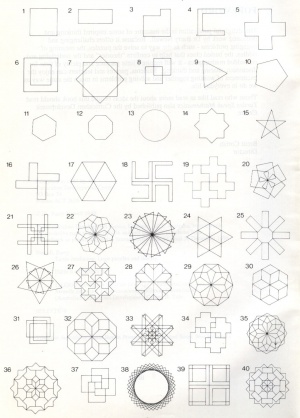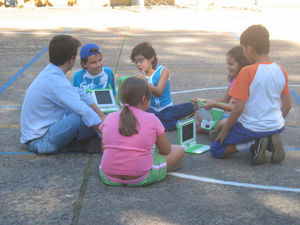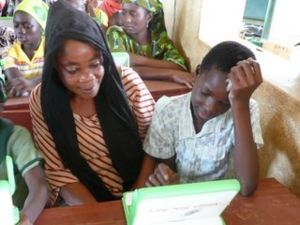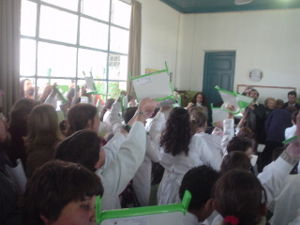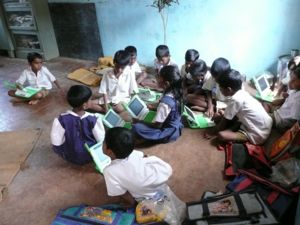Educators
One Laptop per Child is an education project, not a laptop project. With connected laptops, learners are liberated to actively engage with others with similar interests in cultures of learning by doing without being limited by time or space. Children can learn by teaching, actively assisting other learners and freeing the teacher to focus her experience and expertise where most needed. (see also: education philosophy).
In 1980, Seymour Papert described "how children had learned to program a computer could use very specific computational models for thinking about thinking and learning about learning and in so doing, improve their skills as psychologists and epistemologists." However, an important element that was not really present at the time, but available in a controlled way, was the personal computer. Children only had access to computer terminals or computers in computer lab environments. The one to one learning model forces us to rethink education, not only because children use technology in a powerful way, but also because it alleviates the lack of teacher experience and preparation, a bottleneck that limits impact of technology in education.
The OLPC Learning Team, led by Dr. Claudia Urrea and Dr. Antonio Battro, are currently working in Colombia, Rwanda and the US respectively and provide support to countries, teams, community and children engaged in the project.
Background for educators
Some articles on constructionism, emergent design, high-quality education and 1:1 experiences:
- OLPC Fundamental Ideas on Learning, by OLPC Learning Team
- Emergent Design, by David Cavallo
- "Need for high quality education", part 1 and part 2, by David Cavallo
- Situating Constructionism, by Seymour Papert & Idit Harel
- Constructing Knowledge and Transforming the World, by Edith K. Ackermann
- One to One Connections: Building a Community Learning Culture, by Claudia Urrea
Classroom Resources
- Lesson Plan Ideas from the OLPC Team based in Rwanda
- Creating a Business, grade 6 (doc)
- Decimals, grade 4 (doc)
- Lesson Plan Ideas from Sdenka Salas of Peru
- XO in the Classroom (doc)
For additional manuals, please see: Manuals
Resources developed by community groups: from Hello Laptop, from Plan Ceibal, from Peru.
Ideas and Examples
The Learning Team has published a weekly challenge to all XO students through the New Times Newspaper. For a full listing, see XO Time.
In 2009, one group of students became journalists. Six teams from Kagugu Primary School named, designed and created their own newspapers. This allowed some to express their creativity, learn about different research, investigatory methods, better understand sentence development and structure. Newspapers they created:
- Ubumwe Newspaper (doc)
- MWARAMUTSE KAGUGU (doc)
- Chantari Newspaper (doc)
- Kagugu Newspaper (doc)
- Technology Newspaper (doc)
- P4 Newspaper (doc)
Use Turtle Art or Scratch and see if you can create these shapes. The sheet includes both simple and complex shapes, increasing in order of complexity. There is a challenge there for everyone! The more complex shapes are often made up of combinations of the simpler ones.<ref>Examples drawn from [[w:Barry Newell's Turtle Confusion|]] (1988) </ref>
How can I get involved?
Create an account on the OLPCWiki and leave us questions or comments!
Read about the OLPC Learning Vision to learn more about why we think children in developing countries need laptops and what we think laptops will enable them to do. Familiarize yourself with our ideas about content and collaboration, and the various Creative Commons licenses. As a rule, we want educational materials produced for and connected with OLPC to be free and open source.
- If you or your school want to work with XOs in the classroom (and don't yet have any), see the page for Interested schools.
- Visit our participate, contributors program, and projects pages, and see if others are working on a project that interests you. There is also a page specifically for education projects.
- Visit our sister organization, Sugar Labs, and join their wiki.
- Add yourself, or your organization, to the educator Roll Call page.
- Add an educator user box to your user page, which will add you to Category:Educators.
- Create an educational organization page for your organization, group, or school.
Contribute content
- Read about the content repository that will reside on the school servers.
- Add to the list of ideas for content that should be included in the repository.
- Contribute your content directly to OLPC by following these instructions and writing to content@laptop.org.
Create activities and collections
- Read the educational activity guidelines to learn about the features of the XO that pertain directly to educators.
- Explore our repository of activity outlines and lesson plans.
- Contribute to our collection of story-based learning activities.
- Create a new activity, either based on one of our sample learning activities or entirely from scratch.
- Upload your activity or collection to the Sugar Labs activities database.
School stories and case studies
| Porto Alegre OLPC Brazil |
Galadima OLPC Nigeria |
Ban Samkha OLPC Thailand |
|---|---|---|
File:Hiking02.jpg Ban Samkha is a rural village in northern Thailand | ||
| Cardal OLPC Uruguay |
Arahuay OLPC Peru |
Khairat school OLPC India |
Comments
"Pupils go even beyond what I can teach in the class. It's a very interesting thing to use. I personally have a better idea about teaching... We discovered that giving them time to discover something and to do it in their own way, they feel more happy and they are so excited in using it that, 'Yes, I discovered it! Yes, I can get it!! Yes, I can do this on my own!!!' Teaching is getting more interesting and less stressful." — Mr. O., Galadima School, Abuja, Nigeria
